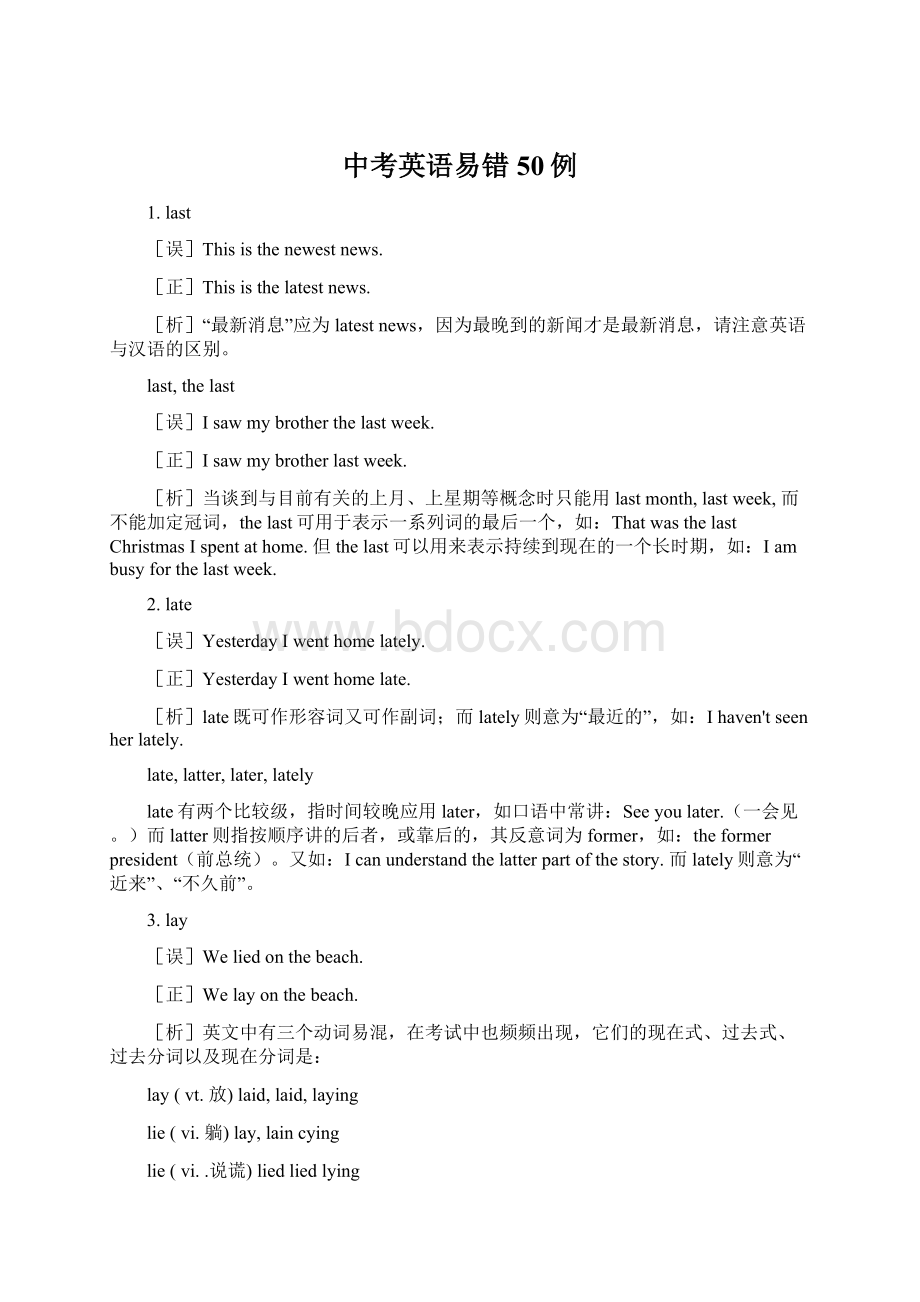中考英语易错50例.docx
《中考英语易错50例.docx》由会员分享,可在线阅读,更多相关《中考英语易错50例.docx(18页珍藏版)》请在冰豆网上搜索。

中考英语易错50例
1.last
[误]Thisisthenewestnews.
[正]Thisisthelatestnews.
[析]“最新消息”应为latestnews,因为最晚到的新闻才是最新消息,请注意英语与汉语的区别。
last,thelast
[误]Isawmybrotherthelastweek.
[正]Isawmybrotherlastweek.
[析]当谈到与目前有关的上月、上星期等概念时只能用lastmonth,lastweek,而不能加定冠词,thelast可用于表示一系列词的最后一个,如:
ThatwasthelastChristmasIspentathome.但thelast可以用来表示持续到现在的一个长时期,如:
Iambusyforthelastweek.
2.late
[误]YesterdayIwenthomelately.
[正]YesterdayIwenthomelate.
[析]late既可作形容词又可作副词;而lately则意为“最近的”,如:
Ihaven'tseenherlately.
late,latter,later,lately
late有两个比较级,指时间较晚应用later,如口语中常讲:
Seeyoulater.(一会见。
)而latter则指按顺序讲的后者,或靠后的,其反意词为former,如:
theformerpresident(前总统)。
又如:
Icanunderstandthelatterpartofthestory.而lately则意为“近来”、“不久前”。
3.lay
[误]Weliedonthebeach.
[正]Welayonthebeach.
[析]英文中有三个动词易混,在考试中也频频出现,它们的现在式、过去式、过去分词以及现在分词是:
lay(vt.放)laid,laid,laying
lie(vi.躺)lay,laincying
lie(vi..说谎)liedliedlying
4.learn
[误]Theteachersaid:
"Youmuststudythispoembyheart."
[正]Theteachersaid:
"Youmustlearnthispoembyheart."
[析]study与learn在作“学习”讲时,常常可以互换,但learn侧重于学习成果或初级阶段的模仿性学习,如:
Thelittlebabyislearningtowalk.而study则多侧重于学习的过程,如:
I'mstudyingatthiscollege.而learn…byheart则是“记住”、“背诵”之意。
5.leave
[误]I'llleaveBeijingtoShanghai.
[正]I'llleaveBeijingforShanghai.
[析]leavefor一词组为“去某地”,如对话中常讲I'llleaveforShanghai.因所离开的地点是双方都知道的则可以省略。
leave,forget
[误]I'veforgottenmyhomeworkathome.
[正]I'veforgottenmyhomework.
[正]I'veleftmyhomeworkathome.
[析]如果句中有地点状语则不要用forget,而要用leave.
6.lesson
[误]IhavetwolessonsofEnglish.
[正]IhavetwoEnglishlessons.
[正]IhavetwolessonsinEnglish.
[析]“我有两节英语课。
”这一表达法如上,但美国老师讲他有两节课时则多用“Ihavetwoclasses.”teachsomebodyalesson为“教训某人”,或“要吸取教训”,如:
Letthisthingteachesyoualesson.
7.lend
[误]Pleaseborrowmeyourbike.
[正]Pleaselendmeyourbike.
[析]borrow是指“借入”,如:
Iwanttoborrowsomebooksfromthelibrary.lend是“借出”,如:
Icanlendyoumybike.而keep为“借多久”,如HowlongcanIkeepit?
8.less
[误]Hehasfewermoneythanshehas.
[正]Hehaslessmoneythanshehas.
[析]less是little的比较级,而fewer是few的比较级。
要注意前者修饰不可数名词,而后者修饰可数名词。
9.let
[误]Theteacherletsthestudentscleantheclassroomasapunishment.
[正]Theteachermakesthestudentscleantheclassroomasapunishment.
[析]虽然let,have,make有相同的用法,但make和have含有迫使某人做某事的意思。
[误]Let'sgotothepark,willyou?
[正]Let'sgotothepark,shallwe?
[误]Letusgotothepark,shallwe?
[正]Letusgotothepark,willyou?
[析]Let'sgo的反意疑问句是shallwe?
而Letusgo的反意疑问句则是willyou?
10.life
[误]ManypeoplelosttheirlifeintheSecondWorldWar.
[正]ManyPeoplelosttheirlivesintheSecondWorldWar.
[析]life作为“生命”、“性命”时应为可数名词;当泛指一般“生活”讲时则为不可数名词,如:
Whichdoyouprefer,townlifeorcountrylife?
又如:
Lifeisnotallfun.
11.light
[误]Thereisadeskwithalitlamponit.
[正]Thereisadeskwithalightedlamponit.
[析]light有两个过去分词:
lighted和lit,当用过去分词作形容词当定语时只能用lighted.light可以用作名词,如:
Themoongetsitslightfromthesun.也可以作形容词,如:
Theclassroomisverylight.还可以作动词,如:
Thelittlegirllitamatch.作形容词时还有“轻”、“浅”等意,如:
Thisboxislight.Ilikelightblue.
12.like
[误]Mysisterisveryasme.
[正]Mysisterisverylikeme.
[析]as作为连词其后要接从句,如:
Sheisagoodstudentashisbrotherusedtobe.而like是介词,其后接宾语。
[误]Doyoulikeswimmingwithmetonight?
[正]Wouldyouliketoswimwithmetonight?
[析]like作为动词当“喜欢”讲时,其后面可接不定式也可接动名词,用不定式多表达一个一次性的动作,如:
I'msorryIdon'tliketogoswimmingtonight.用动名词则表示一个习惯性的动作,如:
Ilikeswimmingverymuch.
like,alike
作为形容词,alike一般不作定语,而只作表语,如;Thetwinsareveryalike.
[误]Wouldyoulikeswimmingwithus?
[正]Wouldyouliketoswimwithus?
[析]在wouldyoulike…这一句型中,其后面只能接不定式,而不能接动名词。
like的用法还要注意以下两点:
①HelikesTom.为“他喜欢汤姆。
”②HeislikeTom.为“他像汤姆。
”第二句话的like为介词,而第一句话的like为动词。
13.listen
[误]Youshouldheartheteahcer'sadvice.
[正]Youshouldlistentotheteacher'sadvice.
[析]hear多侧重于听到某事或某种声音,而listento则侧重于听的倾向性。
如:
Welistenbuthearnothing.例句为“听取某人意见”,所以只能用listentosomeone'sadvice.
14.little
[误]Don'tworry,thereislittletime.
[正]Don'tworry,thereisalittletime.
[误]Thereisalittlewater.ShallIgetsome?
[正]Thereislittlewater.ShallIgetsome?
[析]要注意中英文在同一问题上的表达法是不同的。
如中文“水不多了,我去取点吧。
”英文要讲“没水了,我去取点吧。
”
little,small
little与small是近义词,在作定语时常常可以互换,如:
alittlegirl或asmallgirl,但little一般不作表语,如:
Thecaroverthereissmall.一句中不要用little.作定语时little常常带有感情色彩,而small则带有对比的含义。
15.live
[误]Tomliveswithhisparents'money.
[正]Tomlivesonhisparents'money.
[误]Helivesonteaching.
[正]Helivesbyteaching.
[析]“靠吃某物为生”应用liveonsomething,而liveby是“靠某种生活手段为生”。
living,alive
living侧重于生活得很好,身体不错,如:
Mygrandfatherisstilllivinginhiseighties.而alive则强调没有死而是活着的,如:
Isthatcataliveordead?
16.lonely
[误]Shewantedtodoherhomeworklonely.
[正]Shewantedtodoherhomeworkalone
[析]lonely意为“寂寞的”、“孤单的”,如:
Theoldmanfeltlonely.alone则意为“独自的”、“单独的”,如:
Helivesalonebuthedoesn'tfeellonely.
17.long
[误]Ihavebeenstudyinglongfortheexam.
[正]Ihavebeenstudyingforalongtimefortheexam.
[析]long用作表达时间的副词时,在否定句及疑问句中最常用,但在肯定句中除与so,too,as...as连用外,一般要用foralongtime.
[误]I'llcallyouaslongasthebookwillbereturned.
[正]I'llcallyouaslongasthebookisreturned.
[析]as...as引导的状语从句中可以用一般现在时表示将来。
[误]Howlongdoyougotoseeyourparents?
Onceaweek.
[正]Howoftendoyougotoseeyourparents?
Onceaweek.
[析]因为答语为每周一次所以问的是频率,要用howoften.
18.look
lookfor,find
lookfor侧重于“寻找”这个动作,如:
Whatareyoulookingfor?
而find则侧重于结果,如:
Itisverydifficulttofindajob.这里不能用lookfor,因为真正困难的是“找到”工作。
其他用法还有:
[例]Heoftenlooksbackonhishighschooldays.
[析]lookbackonsomething为“回顾”、“回想”。
[例]Iwishyouwouldn'tlookdownon(upon)thechildren'swork.
[析]lookdownon(upon)为“看不起”某人或某事。
[误]I'mlookingforwardtoseeyou.
[正]I'mlookingforwardtoseeingyou.
[析]lookforwardto词组中的to是介词,所以其后要加名词或动名词,不能接不定式。
19.lot
[误]Icanbuythisdictionarynow,becauseIhavegotmuchmoney.
[正]IcanbuythisdictionarynowbecauseIhavegotalotofmoney.
[析]muchmoney多用于疑问句与否定句中,而在肯定句中要用alotof.lotsof与alotof之间无多大区别,两者都可以修饰可数与不可数名词,所以常常可以互换。
[误]Heismorehappiernow.
[正]Heisalothappiernow.
[析]不可用more来修饰比较级,能修饰比较级的词有verymuch,alot,lots,any,no,rather,alittle,abit等。
20.make
[误]Thelittleboywasmaderepeatthewholestory.
[正]Thelittleboywasmadetorepeatthewholestory.
[误]Thefathermadehissontodohishomeworkfrommorningtillnight.
[正]Thefathermadehissondohishomeworkfrommorningtillnight.
[析]make的句型为“makesomebodydo(doing)something”。
但在被动语态中原来被省去的不定式符号to要被还原回来。
[误]Ialwaysdothismistake.
[正]Ialwaysmakethismistake.
[析]英语中do和make是十分不易弄清的两个动词,do常用于谈论工作时或某种不确定的活动时,如:
doafavour(帮个忙),doone'sbest(竭尽全力),dogood(有益),doharm(有害),而多数情况下常用make,如:
makeasuggestion,makeacake,makeabed(收拾床),makeanoise,makemoney等等。
[误]Thiswinewasmadeofgrapes.
[正]Thiswinewasmadefromgrapes.
[析]当成品制成后,其原料的性质有所改变时应用makefrom,否则用makeof,如:
Thisdoorwasmadeofiron.
[误]Hardworkcanoftenmakeupalackofintelligence.
[正]Hardworkcanoftenmakeupforalackofintelligence.
[析]makeup是“创造”、“编织”,而makeupfor是“弥补……的不足之处”。
上句应译为“勤奋工作可以弥补天资的不足。
”
[误]Wemadeupourmindtostudyhard.
[正]Wemadeupourmindstostudyhard.
[析]mind这里是可数名词,使用时要特别予以注意makeupone'smind是“下定决心”之意。
[误]Ourclassismadeoftwentygirlsandtwentyoneboys.
[正]Ourclassismadeupoftwentygirlsandtwentyoneboys.
[析]makeupof...是“某物由……组成或构成”。
21.many
[误]Ihavemanyfriends.
[正]Ihavealotoffriends.
[析]many和much多用于疑问句或否定句中,而在肯定句中则用处不多,尤其在非正式谈话中。
如:
---Howmuchmoneyhaveyougot?
---I'vegotplenty.
[误]Youboughtmuchtootomatoes.
[正]Youboughttoomanytomatoes.
[析]toomany后接可数名词,toomuch后接不可数名词,而muchtoo后面接形容词,意为“太多”。
[误]Formanyaweeksitrainedalot.
[正]Formanyaweekitrainedalot.
[析]manya意为“好多”、“许多”,但其后面要加单数名词。
22.matter
[误]Nomatterwhatyoudid.
[正]Nomatterwhatyoudid,Itrustedyou.
[析]Nomatter是个词组,意为“不论”,它的语法功能是起连接作用,所以不能用于一个单独的句子。
itdoesn'tmatter这个词组则不是一个连接词组,所以可以和一个单句连用,如:
Itdoesn'tmatterwhatyousay.(你说什么都不要紧。
)
23.maybe
[误]Maybeheisright.
[正]Maybeheisright.
[析]maybe是副词,不要错用为maybe.
maybe,perhaps
这两个词的词意一样,maybe常用于非正式谈话,而perhaps则多用在正式文体中。
如:
Maybe/Perhapstheweatherwillgetbetter.而JuliusCaesarisperhapsthegreatestofShakespeare'searlyplays.
24.mend
[误]Iwanttohavemybikemended.
[正]Iwanttohavemybikerepaired.
[析]mend意为“缝补”,如:
Mymothermendedmycoat.而repair是“修理”。
25.mind
[误]Couldyoumindtoclosethedoor?
[正]Couldyoumindclosingthedoor?
[误]Trytomakeupyourmindstudyinghard.
[正]Trytomakeupyourmindtostudyhard.
[析]mind用作动词时,其后加动名词;而用作名词意为“下定决心”时,其后要加不定式。
要注意DoyoumindifIsmoke?
的答语:
如果你不介意,应回答“No,goahead.”如果你不想让对方吸烟,则应讲“Yes,pleasedon't.”
26.if
[误]IfitwillrainIwon'tgotoschooltomorrow.
[正]IfitrainsIwon'tgotoschooltomorrow.
[析]由if引起的状语从句要用一般时表示将来。
[误]Iwanttoknowifhecomesheretomorrow.
[正]Iwanttoknowifhewillcomeheretomorrow.
[析]if所引起的如果是宾语从句则不能用一般现在时表示将来。
[误]Iwanttoknowifitwillraintomorrowhewillcomeornot.
[正]Iwanttoknowifitrainstomorrowhewillcomeornot.
[析]这里的if从句是整个宾语从句的条件状语,所以,应用一般时表示将来。
27.ill
[误]Hespentmanyyearslookingafterhisillfather.
[正]Hespentmanyyearslookingafterhissickfather.
[析]ill和sick都可以作表语,如:
I'mill(sick).美国英语中常用sick,而英国英语中两者都可用,但ill一般不作定语。
28.in
[误]Inacoldmorning,Iwenttoschoolalone.
[正]Onacoldmorning,Iwenttoschoolalone.
[析]在inthemorning或intheafternoon词组中,不论在这两个名词的前或后加任何修饰词,其介词in都要变为on.
[误]Iwillfinishitaftertwodays.
[正]Iwillfinishitintwodays